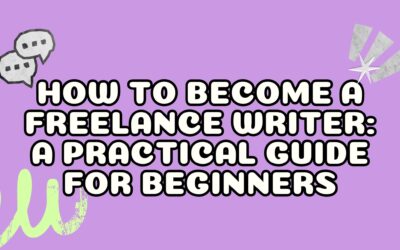My latest podcast episode is all about the future of freelancing:
Unless you’ve been hiding under a rock, you’ve probably heard all the talk about ChatGPT for writers—will it replace us? Is it a flash in the pan? Are robots going to take over the world?
It’s endless.
There are two sides to the coin:
- AI will never replace writers because it’s… not human
- AI will replace writers and we should all lower our rates right now to account for it
The latter is a narrative that I’ve seen crop up a couple of times, surprisingly from some big-name freelancers.
One Instagram Reel announced that ChatGPT will help writers because we can churn out 500-word pieces in seconds and sell them to our clients 🙄
Here are my two cents on that: WHY would a client pay for that when they can do it themselves? It literally takes seconds.
So, no, I don’t think we should be rushing to lower our rates or churn out useless pieces just because we can.
This is where high-quality writers with specialist skills, talents, and niches will come into their own. This is our time to shine babyyyy.
ChatGPT for writers: What’s it good for? What does it suck at?
I’ll give ChatGPT one thing: I was impressed.
The first time I used it, I gave it a little prompt and in seconds it was typing away behind the scenes making content for me.
Here’s what I think it will be good for and what it definitely will not replace.
ChatGPT will be good for:
- Eliminating blank page syndrome. I gave it a prompt to write an intro for a piece and it threw back some great starting points. (Note: STARTING points).
- Suggesting dinner ideas and recipes (I literally spent most of my time on it doing this—choosing what to have for dinner takes up a HUGE chunk of my day, so outsourcing this might be the best thing I ever do??)
- Helping non-writers get words on a page. My partner has been putting off writing the homepage copy for his new website for weeks, but I showed him ChatGPT and he was inspired to get started from the info the AI bot suggested to him.
- Short, factual pieces of content. There’s not much personality in ChatGPT’s outputs and it doesn’t do anecdotes and emotions. But if you want to write a lot of short, factual pieces quickly, it’s pretty good for that.
ChatGPT will be bad for:
- Deep pieces of content. The content ChatGPT served was very surface-level and same-y. It didn’t have any personality, no anecdotes, and absolutely no personal experiences tied in (because it’s not a person, duh), so it did feel very much like it had been generated by a non-human for the sake of it.
- Standing out. Content is a great way to position your brand, but to do that you have to have SOMETHING that makes you stand out. Because ChatGPT’s content is very surface-level, there’s very little that will set you apart from your competitors (especially those who are using real people, real experiences, and real examples to enhance their content).
- Anything other than surface-level content. The type of content I write could never be replicated by a machine that doesn’t feel emotions or understand human thought processes.
While ChatGPT will act as a good starting point, the pieces it creates will need a lot of human intervention to add stories, anecdotes, and experiences—the things that make content engaging and… well, GOOD.
How freelance writers can use ChatGPT to their advantage
And no, I don’t mean by asking it to churn out fluffy 500-word pieces.
After playing around with OpenAI for a little while, I realised that while it CAN create content, the content it creates is not very good. Yes, it’s English and grammar is top-notch, but it reads robotic and is very surface-level.
However, there are some things it does that can make our lives as writers easier…. I’m talking about the tedious parts of writing content.
1. Finding stats to include in your pieces
Type “find me a stat about X in 2021 with the source”.
You can get quite specific with the kind of stat you want, but bear in mind, ChatGPT has only been loaded up with info from before 2021. If you’re looking for something more recent, you’ll have to do the digging yourself until it’s been updated.
Finding stats is one of the biggest time-sucks when writing for me, so this can be a great starting point (and save you endless hours scrolling through Google).
2. Suggesting blog post titles
Type “recommend some blog post titles for a piece about X”.
You can always tweak these and plug them into CoSchedule’s Headline Analyzer to see whether they’re hitting the spot.
One of the best activities I learned for writing headlines is to write down 20 potentials. The further down the list you get, the more creative you’ll get and it’ll force you to think outside the box. I recommend you only use ChatGPT as a starting point and launch off from there with your own ideas and suggestions.
3. Getting relevant keyword ideas
Type “can you provide additional keywords for the phrase X”.
This will give you an idea of other words and topics to discuss in your piece.
This is perfect if you have been given a huge topic to tackle and need a starting point. The keywords ChatGPT lists aren’t backed up by numbers or competitiveness, but they can provide subheader ideas and themes you can talk about in the piece.
4. Writing quick, leggy outlines
Type “write an outline for a blog post about X”.
This provides a good starting point, but you’ll want to enrich it with real-life research. I find outlines the hardest to start because I’m essentially starting with a blank page. ChatGPT can help ease that pain by suggesting some topics to cover and a structure to your piece.
Caveat: You’ll definitely want to give the piece your own input. The outline ChatGPT suggests will likely be very surface-level and won’t dive into detail. You can pair it with other tools like SEO Minion, Surfer SEO, and even Amazon Books to help you fill in the gaps and make your piece stand out against all the other similar ones out there.
5. Finding experts to quote and interview
Type “who is an expert on X”.
If you’re trying to find quotes from experts or want to reach out to speak to an SME for a piece, this can be a starting point for finding the right people.
Bear in mind: It usually comes up with the top industry experts who we all know can be a little difficult to reach, but worth a try! Alternatively, you can use the results to find blogs, social media content, and podcasts by the suggested experts to pull quotes from.
6. Get inspiration for your introduction
Type “write a fun and personable introduction to a piece about X”.
Obviously, you’re going to want to edit this, but it can be a good launch point if you’re suffering from the dreaded blank-page syndrome!
You can get ChatGPT to write a “working intro” for you while you write the rest of the piece and then come back to add in your own touch based on the information and topics you’ve covered.
7. Sourcing real-life examples and case studies
Type “what’s an example of a brand that does X”.
If you’re struggling to find examples to include, this can really help start your search. It usually provides examples from big-name brands so if you want smaller examples, refine the search by using DTC or small businesses.
Again, this is a huge time-suck for me (it’s the reason I started a master list of brands I can use as examples), so any help is much appreciated!
Is AI going to replace freelance writers?
Sure, if we want cookie-cutter 500-word blog posts that all say the same thing and keep multiplying in some kind of meta-content strategy it COULD replace writers.
But, it probably won’t. Not in the way we think.
I write and have written content for AI tools (that’s the actual blog posts and content they put on their sites). They use actual writers to do that because an AI tool can’t interview SME experts and create a unique brand-led perspective on something.
AI doesn’t have a creative brain. It doesn’t feel emotions the way humans do. Yet, anyway.
I’ve spoken to tons of businesses that use AI in their content creation process. They all say the same thing: AI is great for saving time outlining and getting the basics down, but it doesn’t compare with a human finishing touch.
They ALL use AI in tandem with real-life writers and ALL of them say that they have absolutely zero plans to replace their writers with an AI tool.
Here’s what some of them have said:
“As I generated the copy for these old articles, some were better than others. You have to tweak and restructure what AI gives you since it’s not always perfect.”
“The outputs from AI writers lacked emotion, thought, proper grammar, organization, fact-checking, and appeal. It just wasn’t interesting to read. It required extensive editing and actually took more time to use vs. writing my own content.”
“I think AI can be helpful under certain conditions. But I don’t see it as a replacement for writers or content marketers, especially since Google shared that AI-generated content is against their community guidelines.”
“It’s important to note that AI can’t produce valuable content on its own. It relies on humans to input the right prompts and descriptions. Human professionals also have to ensure that the content provides valuable insights that are fact-based and relevant.”
“Businesses thinking about employing AI in writing should remember that it is merely a tool and should not be utilized in place of a human writer. The key is to make the most of both resources. AI cannot adjust its copy to fit the appropriate voice, tone, and context, whereas a human writer can.”
So when people ask me if I’m worried about AI taking over my work, the simple answer is no.
I’m more than happy to work side-by-side with AI to generate ideas, eliminate the dreaded blank page syndrome, and scale content that CAN be scaled.
But I specialise in creating content that goes far deeper than an AI tool can right now. I love speaking to experts, finding unique perspectives, collecting real-life case studies, and writing a story around a topic.
If I was in the business of churning out fluffy pieces “just because”, I probably would be worried. But for now, AI can take away some of my least favourite parts of content creation so that I can focus on what I love doing: the actual writing!






0 Comments